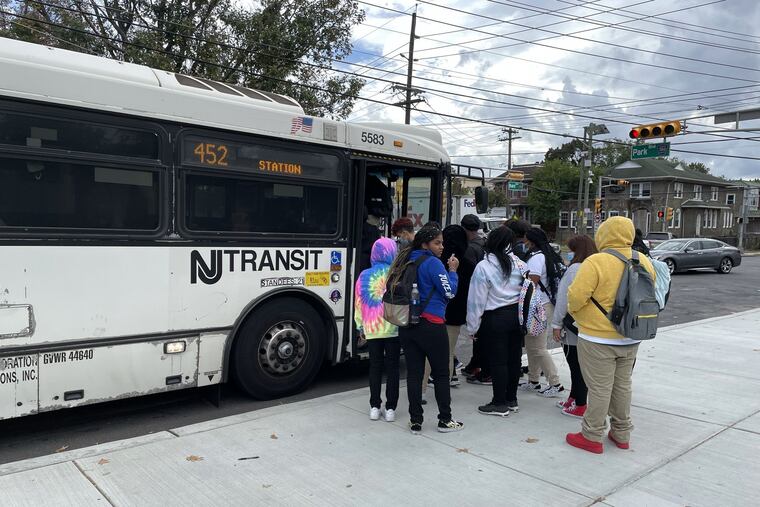N.J. school districts continue to change their bell schedules — and frustrate parents — to cope with the bus shortage
Already, bell schedules have been staggered in Camden and Glassboro schools to give existing drivers enough time to finish and restart routes. Deptford schools change times on Monday.

Beginning next week, most students in Deptford public schools will have new start and end times, the latest effort by the South Jersey school system to cope with a bus driver shortage that has left schools around the country struggling to transport students.
Already, bell schedules have been staggered in Camden and Glassboro schools to give existing drivers enough time to finish and restart routes — and keep kids from being stranded at the start or end of school days — but the adjustments have left families scrambling to alter work schedules or arrange unexpected childcare.
» READ MORE: Will school buses roll? A national school driver shortage may leave some students stranded
“We know that this is an attempt at a stop-gap solution,” said Camden superintendent Katrina McCombs. “It comes at an expense of being an extra burden on families.”
The Philadelphia School District changed start and end times this year to standardize bus routes, too, shifting some high schoolers’ start time by two hours.
This year, Camden implemented a two-tier schedule based on geography to expedite bus routes. For the first tier, school begins at 7:50 a.m. and ends at 2:10 p.m., and classes go from 8:45 a.m. to 3:05 p.m. for the second tier, which includes the high schools, McCombs said. The district may add a third starting time if it helps alleviate the driver shortage, she said. Previously, the school day started at 8:25 a.m. for all students and ended at 2:55 p.m.
Even with the changes, Camden has been unable to provide bus transportation to about 500 of its 2,500 eligible students, McCombs said, which include those enrolled in traditional public schools, charter, and renaissance schools.
McCombs said most families have been able to get their children to school either by driving, carpooling, using public transportation and Uber or Lyft rides, or walking. The district obtained state approval to lower the required insurance liability from $1 million to $15,000 to enable more parents who want to legally assume the responsibility to drive their children to school, she said.
“The determination of parents to get their children to school in the midst of this crisis has been inspiring,” McCombs said. “At the end of the day, we want our children in school.”
McCombs said the state Department of Education is allowing Camden to provide remote instruction to the 60 to 65 students who have not been coming to school because of transportation, she said. Their absences have been excused, and school officials are delivering Chromebooks to those students, she said.
In the meantime, the Camden Education Foundation has offered $3,000 signing bonuses to recruit drivers who already hold commercial driver’s licenses to work in the city, and $1,000 to newcomers to obtain a license, said Naeha Dean, its executive director.
In a letter to parents, Deptford school superintendent Arthur E. Dietz cited the school bus driver shortage amid what he called “unprecedented times” for the need to adjust start and end times. The change will give drivers ample time to complete the adjusted routes, he said.
Starting Monday, Deptford High School will dismiss 15 minutes earlier to be on a 7 a.m. to 1:30 p.m. schedule, while elementary schools in the Gloucester County district will open later to operate from 8:30 a.m. to 3:10 p.m. The kindergarten program will have three start and dismissal times beginning at 9:15 a.m. and ending at 3:45 p.m. Only the middle school remains unchanged, from 7:35 a.m. to 2:25 p.m.
“Although we have certainly improved the timing issues since the first day of school, we have likely gotten as good as we’re going to get with the number of available drivers and the current routes,” Dietz wrote.
In a Facebook group, Deptford parent Niki Jo said her son keeps missing the high school bus home because it’s leaving while he’s still changing from his gym class, so she has had to rearrange her schedule to pick him up at the 1:30 p.m. dismissal.
“Who gets out that early? This is nuts,” she wrote.
Jamie Hoard said her son gets picked up at 7:30 a.m. and gets home from the bus at 4:30 p.m., which she believes is a long day for a second grader.
Dietz and a district spokesperson did not respond to several requests seeking comment.
Kara Ieva, an associate professor in the College of Education at Rowan University, worries about the impact of schedule changes for students who have not settled into an academic routine, especially following a year when most attended virtual or hybrid classes.
“Are kids going to be resilient and just go with the flow? Sure, but that’s not everybody,” said Ieva.
Ieva, who has two children in Glassboro public schools, said she will have to juggle her schedule after the district announced its second bell change last week. Starting Oct. 12, the district will change the start and end times at the J. Harvey Rodgers, Dorothy Bullock, and Thomas Bowe elementary schools.
Earlier this month, the district altered the regular dismissal times at its high school and middle schools, shortening the day by about 45 minutes. The move was made so that older students would be released and be able to get home before their younger siblings.
In a letter to parents, Superintendent Mark J. Silverstein said the abbreviated schedule for the high school and middle school would remain until the district hires more bus drivers. The other schedule changes are expected to remain in effect for the remainder of the 2020-21 school year, he said.
“There are a lot of things you can’t preplan in a COVID world,” Ieva said. “I just feel like this could have been handled better.”